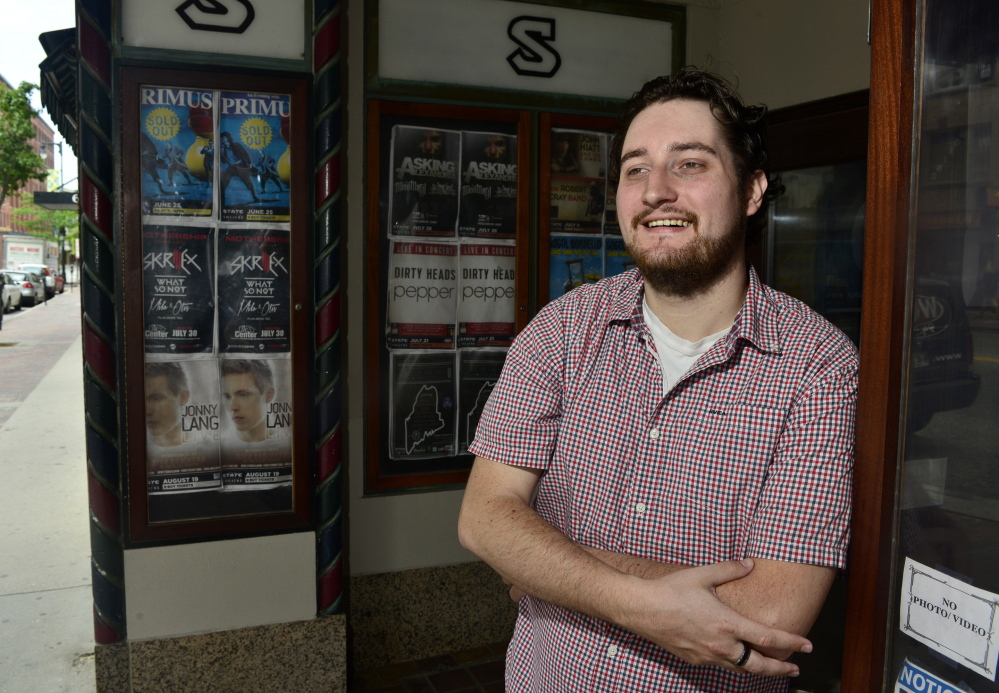Failure is a part of every entrepreneur’s journey, and Cody DeLong experienced his share early.
At 16, he began booking and promoting local heavy metal and punk concerts where he grew up in Fremont, New Hampshire. He walked into school one morning after pocketing $1,000 from a successful concert the night before, thinking he had a pretty sweet gig. But it didn’t always turn out so well. At 18, he found himself several thousand dollars in the hole after a show he booked in Exeter, New Hampshire, bombed. He borrowed the $3,000 from his mom to make up the difference.
DeLong laughs about the experience now, but at the time it was a hard lesson in the music business. Today, the 25-year-old is marshaling that experience into his startup in Portland that is on track to post $2 million in revenue this year.
“I definitely come from that DIY mentality,” DeLong said on a recent morning in a Portland coffee shop. “I’d always win the magazine drive in middle school and get to ride in the limousine. I definitely had a hunch for selling and being an entrepreneur.”
Called Sound Rink, DeLong’s company creates and sells VIP packages to fans of touring musicians. The business is growing in response to changes in the music industry that are forcing musicians to search for ways to diversify their revenue streams.
“As recorded music kind of falls off and there’s less and less money to be made from selling records, people are definitely looking for new avenues and one of the big areas in the last five years is these interactions with the artists at a live show,” said Randy Nichols, a band manager in New York and consultant who assists startups in the music industry.
While the average concert-goer may pay $30 for a general admission ticket, a superfan may be willing to pay twice that for a VIP package that contains a ticket, a meet-and-greet with the band, a signed custom screen-printed poster and a T-shirt. Band managers like Nichols hire Sound Rink to create, provide the merchandise and sell these VIP packages.
Industry observers are taking notice. Last month, Sound Rink attracted a major investment from Steve Reddy, owner of a well-known record label in the metal-punk scene called Equal Vision Records and a merchandising company. The infusion of cash will help Sound Rink scale up more quickly.
The company hasn’t created any local jobs yet, but DeLong is committed to keeping it in Portland and hopes to create at least a half-dozen jobs in the next five years and grow revenue to $20 million to $30 million.
“I could be anywhere, but I choose to be here,” he said.
CHANGING THEIR TUNE
There’s no doubt the music industry is changing. It’s never been easier to listen to your favorite band’s music or to discover a new musician. Services like Pandora and Spotify allow fans to stream music of their choice. Fans can download their bands’ favorite singles on iTunes, no longer having to buy the entire album for one song. For the consumer, the change may be welcome. But the advent of digital downloads and instant streaming has made it harder for musicians to make money from album sales. That has prompted an interest in diversifying revenue by touring more, selling more merchandise and experimenting with more creative ways to sell an experience to fans.
“(Sound Rink) is representative of that,” said Kristin Thompson, a researcher at the Future of Music Coalition and co-director of its Artists Revenue Streams project. “They’re monetizing the experience of meeting the band or getting special treatment at a show.”
Music CD sales have fallen from roughly $13 billion in 1999 to about $2 billion in 2013, according to the Recording Industry Association of America. During the same period, concert sales have exploded. In 2013, the North American concert business was worth $5.1 billion, a 200 percent increase from the $1.7 billion generated in 2000, according to Pollstar, a trade journal that covers the concert industry. While selling VIP packages are a small “ancillary part” of the concert business, Thompson said it could grow as musicians look for new revenue.
Industry observers like Nichols, who has invested in two music startups, but is not financially involved with Sound Rink, are watching closely as a number of startups are looking to disrupt the traditional music industry.
Other companies have popped up in the last five years to provide VIP packages, but DeLong said Sound Rink’s competitive edge is its software platform, which not only sells VIP packages, but also builds fan communities around these bands through the use of social media.
That could give Sound Rink an edge, says Nichols.
“A lot of these companies have great systems and relationships and lock-in superstar acts, but don’t update their software often,” he said. “You use their platform to sell your VIP packages and it feels like the same software you’ve been using since 2003.”
Nichols used Sound Rink to sell VIP packages for Bayside, a “punk-leaning” rock band he manages.
“It went exceptionally well,” Nichols said.
He estimates the addition of VIP packages to a band’s retinue of offerings could increase monthly sales while on tour by 25 percent.
“For those types of bands, they’re making the majority of their living from selling merchandise at their shows and now this meet and greet has become major piece of the puzzle as well,” he said.
LEAN STRATEGY
Like many entrepreneurs in Portland and throughout Maine, DeLong, 25, flies under the radar because he doesn’t have a consumer-facing product or a bricks-and-mortar store. He rents a small office space in the State Theater building on Congress Street. His fiance, Maine native Verity Cushman, works with him as an assistant.
DeLong doesn’t look like your average CEO – something he’s perfectly fine with. He comes from the world of heavy metal. A chest tattoo peeks out from the collar of his black T-shirt. He wears gray shorts and his feet are housed in a pair of suede buck dress shoes.
“Take me for what I am,” he said. “I could never see myself wearing a suit.”
He saw his opportunity to create VIP packages while working as a booking agent for punk and metal bands at The Kenmore Agency, which at the time was based in Massachusetts. He thought he could bring added revenue to the bands he booked by offering better experiences to fans willing to pay for them.
So DeLong, along with two partners – Jason Mageau and Scott Lee – launched Sound Rink in January 2012 as a side project. After nearly a decade of experience as a booking agent, DeLong knew he wanted to spread his wings.
“I needed to use the knowledge I’ve gained to build my own company,” he said. “Being an agent isn’t sustainable.”
When DeLong’s boss at The Kenmore Agency announced he was moving to California, DeLong relocated as well. In July 2012, six months after launching Sound Rink, he moved to Portland with Cushman. He still works at The Kenmore Agency, though Sound Rink is quickly taking up more of his time. He expects to keep only a few booking clients next year, including Maine’s homegrown rapper Spose.
During Sound Rink’s first year in business, DeLong said, “we didn’t pay ourselves jack squat.” The co-founders reinvested everything into the business and hired a developer, James Dufour, in September 2012 to build out the website’s software to allow Sound Rink’s clients – band managers and tour promoters – to have access to real-time data on VIP ticket sales. Dufour is now a minority owner in the company.
“We operate as lean as possible,” DeLong said.
Even Steve Reddy’s investment, which DeLong declined to specify, is being managed carefully. DeLong has hired a consultant to help build the company’s West Coast business and has moved a few back-burner projects up.
DeLong believes his platform could also help artists in other industries, such as authors who would use VIP experiences with fans in book-promotion tours. Cooking celebrities, who also tour to promote books or television shows, could utilize the platform DeLong and his team have developed.
While Sound Rink’s early focus has been on punk, metal and alternative rock bands due to DeLong’s familiarity, he plans to expand the company’s presence into other musical genres and perhaps beyond the music industry. The country genre is exploding right now, and DeLong says that’s one area he hopes the company can move into.
“I make sure to be ingrained in every genre of music,” DeLong said. “I come from the metal world, but that just happens to be where I’m from.”
Send questions/comments to the editors.




Success. Please wait for the page to reload. If the page does not reload within 5 seconds, please refresh the page.
Enter your email and password to access comments.
Hi, to comment on stories you must . This profile is in addition to your subscription and website login.
Already have a commenting profile? .
Invalid username/password.
Please check your email to confirm and complete your registration.
Only subscribers are eligible to post comments. Please subscribe or login first for digital access. Here’s why.
Use the form below to reset your password. When you've submitted your account email, we will send an email with a reset code.